-
ORIGINAL ARTICLE08-07-2023
Perception of Portuguese nurses: clinical supervision and quality indicators in nursing care
Revista Brasileira de Enfermagem. 2023;76(3):e20220656
Abstract
ORIGINAL ARTICLEPerception of Portuguese nurses: clinical supervision and quality indicators in nursing care
Revista Brasileira de Enfermagem. 2023;76(3):e20220656
DOI 10.1590/0034-7167-2022-0656
Views0See moreABSTRACT
Objectives:
to describe nurses’ perception of the influence of clinical supervision on improving quality indicators in nursing care.
Methods:
exploratory research with a qualitative approach, carried out with 16 nurses using the focus group. Data processing emerged from lexicographical textual analysis, resorting to Descending Hierarchical Classification and similarity analysis.
Results:
80.0% retention of 185 text segments with six-class construction. The words were represented by four graphs (supervisor, audit, care, and process); and three subgraphs (implementation, sharing and knowledge).
Final Considerations:
in the perception of nurses, supervision influences quality indicators in nursing care.
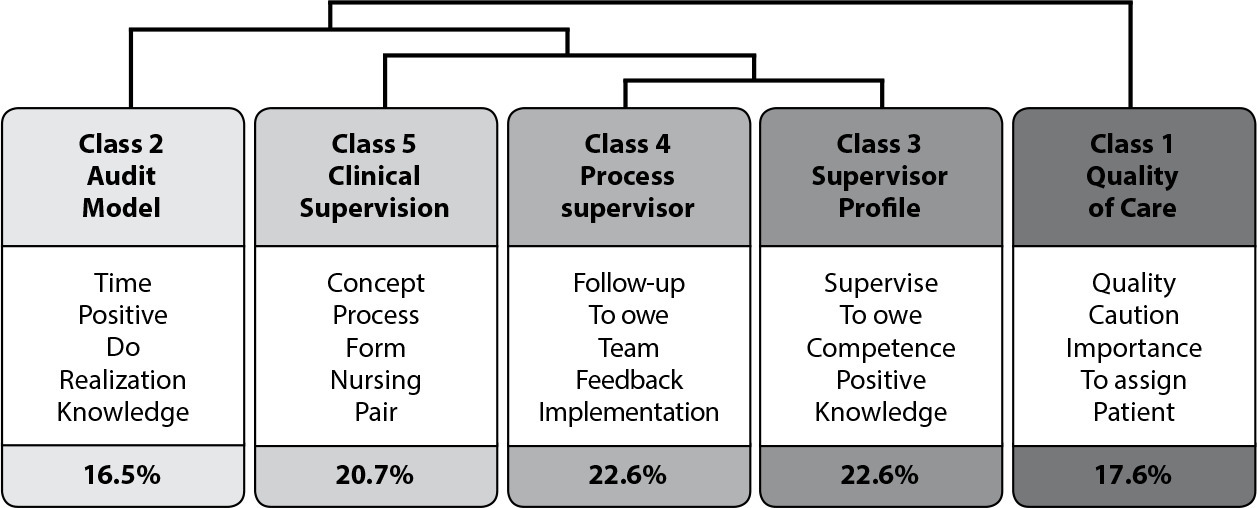
-
REVIEW08-07-2023
Early diagnosis of HIV/aids infection: concept analysis
Revista Brasileira de Enfermagem. 2023;76(3):e20220565
Abstract
REVIEWEarly diagnosis of HIV/aids infection: concept analysis
Revista Brasileira de Enfermagem. 2023;76(3):e20220565
DOI 10.1590/0034-7167-2022-0565
Views0See moreABSTRACT
Objectives:
to analyze the concept of “early diagnosis of HIV/Aids infection” in light of Walker and Avant’s conceptual analysis model.
Methods:
concept analysis study based on the framework proposed by Walker and Avant, instrumented by a scoping review conducted in April 2022, following the recommendations of the Joanna Briggs Institute and checklist Preferred Reporting Items for Systematic reviews and Meta-Analyses extension for Scoping Reviews. The search was made in eight data sources, obtaining sixteen articles.
Results:
the study found homosexual intercourses, early examination, anti-HIV antibodies, CD4 count, and sexually transmitted infection as the main attributes of the concept. As antecedents: information, risky behavior, unprotected sexual relations, prevention, and access to the service. As main consequences: antiretroviral treatment, seroconversion, transmission, and consultations.
Final Considerations:
the study approached the circumstantial situations of the theme, its attributes, antecedents, and consequences, qualifying the work process based on knowledge of nursing practice.
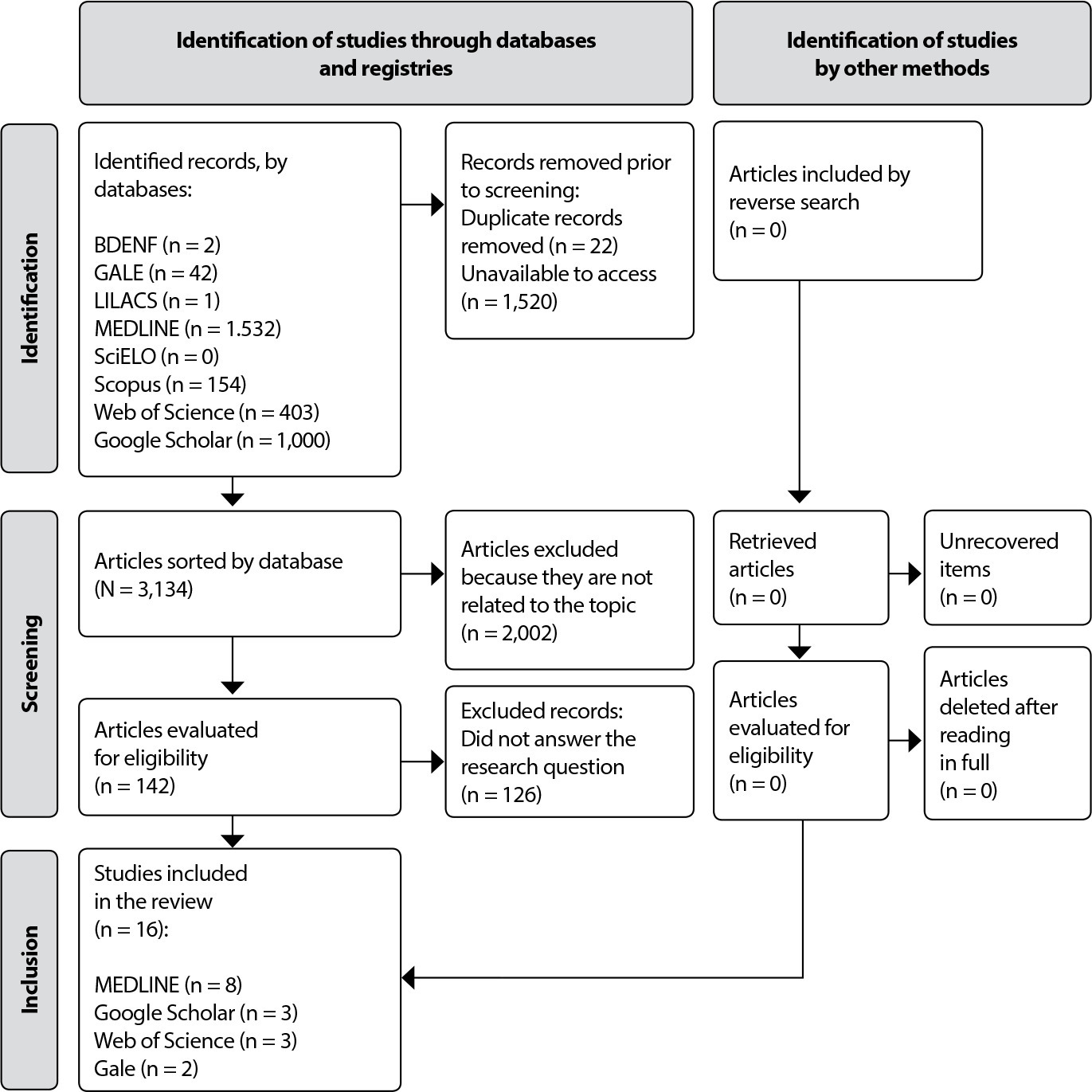
-
ORIGINAL ARTICLE08-07-2023
Workload assessment: cross-cultural adaptation, content validity and instrument reliability
Revista Brasileira de Enfermagem. 2023;76(3):e20220556
Abstract
ORIGINAL ARTICLEWorkload assessment: cross-cultural adaptation, content validity and instrument reliability
Revista Brasileira de Enfermagem. 2023;76(3):e20220556
DOI 10.1590/0034-7167-2022-0556
Views0See moreABSTRACT
Objectives:
to adapt, validate the content and assess the reliability of the instrument National Aeronautics and Space Administration – Task Load Index, translated into Brazilian Portuguese.
Methods:
a methodological study, divided into five steps: translation; synthesis; back-translation; assessment of the Portuguese version by an expert committee; pre-test and content validity of the final version by health professionals working in inpatient units. The Content Validity Index (CVI) (minimum 0.80) and Cronbach’s alpha (minimum 0.70) were calculated.
Results:
in the first round, in the agreement analysis of the translated version, three items did not reach the minimum CVI value. It was decided to remove the statement. The instrument title and items “performance” and “effort” were changed. There was consensus and approval of the final version in the pre-test step.
Conclusions:
the NASA Task Load Index instrument, adapted to Brazilian Portuguese, presents reliability and content validity evidence.
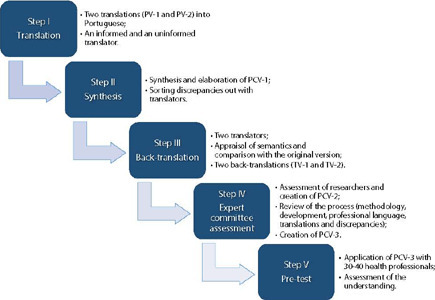
-
REVIEW08-07-2023
Instruments for assessing foot self-care of people with diabetes: a scoping review
Revista Brasileira de Enfermagem. 2023;76(3):e20220555
Abstract
REVIEWInstruments for assessing foot self-care of people with diabetes: a scoping review
Revista Brasileira de Enfermagem. 2023;76(3):e20220555
DOI 10.1590/0034-7167-2022-0555
Views0See moreABSTRACT
Objectives:
to map, in the world literature, instruments for assessing foot self-care of people with diabetes.
Methods:
a scoping review in Scopus by Elsevier, MEDLINE via PubMed, LILACS, SciELO databases and gray literature, using the controlled words diabetic foot, self care, questionnaire. Search was carried out in February and March 2021, according to JBI recommendations and PRISMA-ScR extension.
Results:
fifteen studies made up the review, 14 articles and one thesis, published between 2000 and 2020. 16 instruments were identified: five with an emphasis on general self-care and 11 on foot self-care. Inspection, hygiene, washing and drying between the toes, lotion application and use of proper shoes and socks were the main self-care measures presented.
Final Considerations:
foot self-care is assessed by knowledge, social support and frequency with which measures are being put into practice, encouraging professional practice.
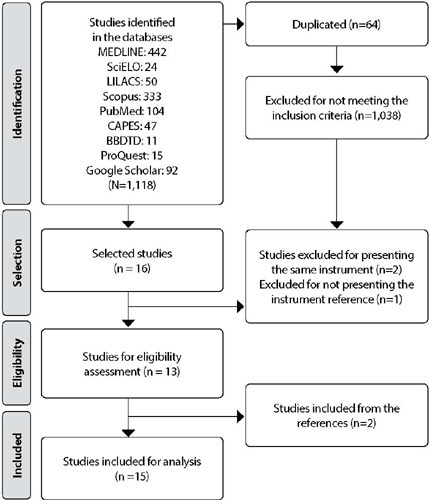
-
ORIGINAL ARTICLE08-07-2023
“Educational Material on HIV”: validity of health educational technology for people living with HIV
Revista Brasileira de Enfermagem. 2023;76(3):e20220549
Abstract
ORIGINAL ARTICLE“Educational Material on HIV”: validity of health educational technology for people living with HIV
Revista Brasileira de Enfermagem. 2023;76(3):e20220549
DOI 10.1590/0034-7167-2022-0549
Views0See moreABSTRACT
Objectives:
to validate the educational technology “Educational Material on HIV” (INPI – BR 10 2020 003765 0).
Methods:
a methodological study with 39 expert judges in HIV/AIDS, using a 5-point Likert scale for assessment. Data were tabulated, processed and analyzed through descriptive analysis. Cronbach’s alpha and McDonald’s omega tests were performed to analyze internal consistency, and the Intraclass Correlation Coefficient, for reliability. Agreement was established by a Level Content Validity Index greater than 0.90.
Results:
the assessment instrument showed high internal consistency (Cronbach’s alpha of 0.89; McDonald’s omega of 0.91) with reliable values. Based on the Intraclass Correlation Coefficient, judges’ answers showed acceptable reliability, mean score 0.89 (p<0.001). Agreement among judges was greater than 0.90 in the three assessed dimensions (objectives, presentation and relevance).
Conclusions:
the technology was considered a qualified and adequate tool by the judges regarding its objectives, presentation and relevance.
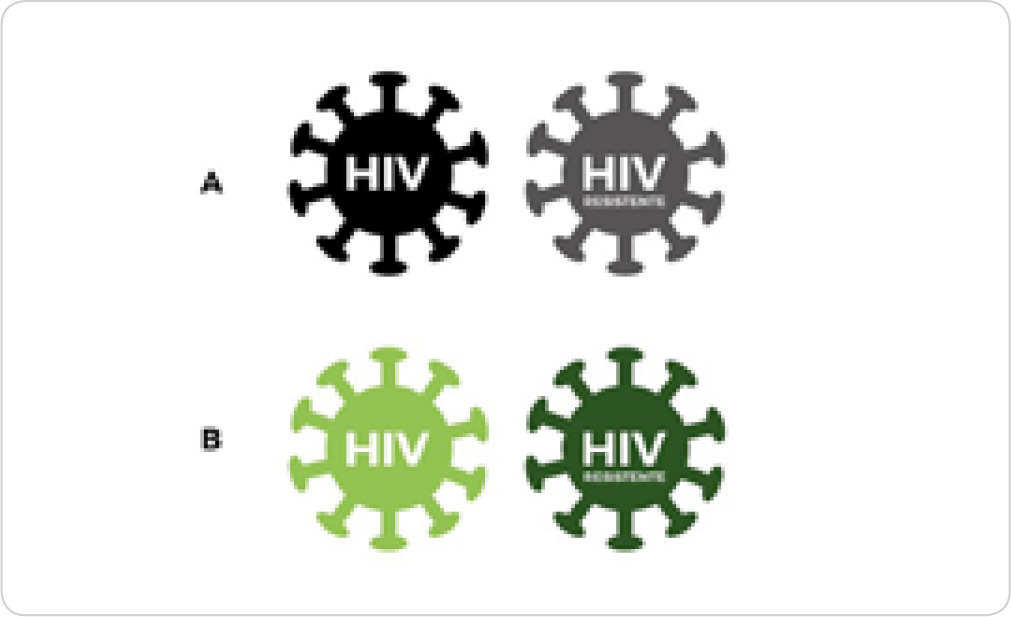
-
ORIGINAL ARTICLE08-07-2023
Content validity of the Post-Stroke Guidance and Follow-up Booklet
Revista Brasileira de Enfermagem. 2023;76(3):e20220532
Abstract
ORIGINAL ARTICLEContent validity of the Post-Stroke Guidance and Follow-up Booklet
Revista Brasileira de Enfermagem. 2023;76(3):e20220532
DOI 10.1590/0034-7167-2022-0532
Views0See moreABSTRACT
Objectives:
to provide sources of content validity evidence for the Post-Stroke Guidance and Follow-up Booklet.
Methods:
a quantitative-qualitative approach, using two Delphi method and content analysis rounds. The Educational Content Validation Instrument in Health was sent to 53 independent judges. A Content Validity Index above 0.90 was considered.
Results:
of the 14 nurses who participated, 64.3% have experience with stroke care, 35.7% with primary care and 64.3% with educational material production. In content analysis, judges’ suggestions were stratified into four categories: material conformation, objectivity, accuracy and perception. Spelling changes were made to the images, addition of functionality scale, adequacy of technical terms and language. The Content Validity Index in the second round showed a concordance of 0.97.
Conclusions:
the booklet presented satisfactory content validity sources of evidence.
-
ORIGINAL ARTICLE08-07-2023
Construction and validity of the Interprofessional Communication in Health Scale
Revista Brasileira de Enfermagem. 2023;76(3):e20220483
Abstract
ORIGINAL ARTICLEConstruction and validity of the Interprofessional Communication in Health Scale
Revista Brasileira de Enfermagem. 2023;76(3):e20220483
DOI 10.1590/0034-7167-2022-0483
Views0See moreABSTRACT
Objectives:
to construct and validate the Interprofessional Communication Scale in Health.
Methods:
a psychometric study was carried out on a sample of 360 nurses from a hospital and university center in central Portugal. Reliability was assessed through internal consistency and construct validity through exploratory and confirmatory factor analysis.
Results:
the Interprofessional Communication in Health Scale, consisting of 27 items, is organized into 3 factors: “Teamwork”, “Conflict management” and “Leadership”, with a total variance of 51.1%. Good internal consistency was obtained, with a Cronbach’s alpha of 0.842, and adequate Goodness of Fit Index model.
Conclusions:
the Interprofessional Communication in Health Scale presents a factorial structure with adequate validity and reliability results, and may constitute a useful self-report instrument in assessing interprofessional communication in health.
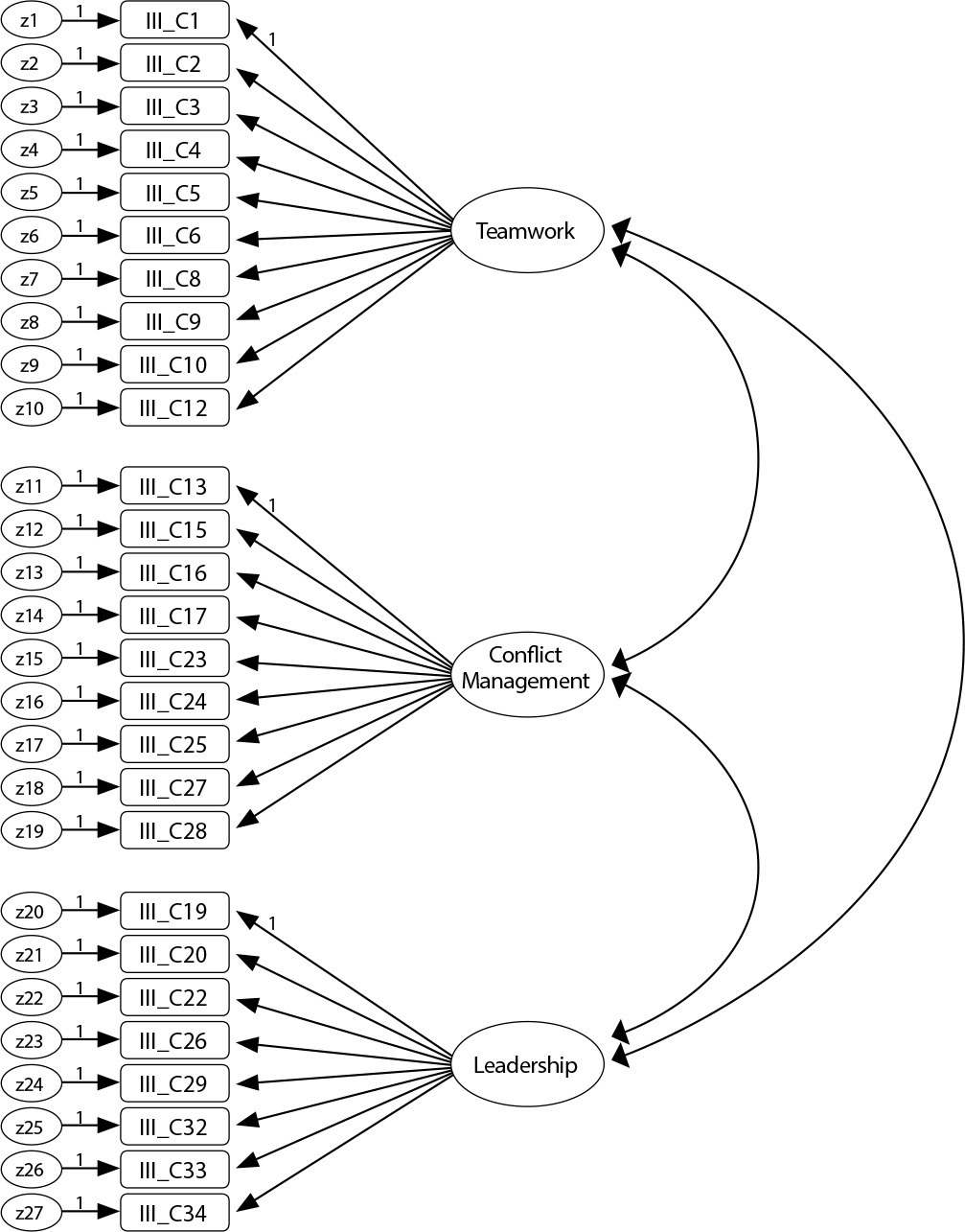
-
ORIGINAL ARTICLE08-07-2023
Systematization of Nursing Care: how did the concept mature?
Revista Brasileira de Enfermagem. 2023;76(3):e20220464
Abstract
ORIGINAL ARTICLESystematization of Nursing Care: how did the concept mature?
Revista Brasileira de Enfermagem. 2023;76(3):e20220464
DOI 10.1590/0034-7167-2022-0464
Views0See moreABSTRACT
Objectives:
to analyze the Systematization of Nursing Care conceptual maturation from the perspective of pragmatic utility.
Methods:
a concept analysis study. The stages were: select the concept; elaborate analytical questions; comprehensively review the literature; and determine concept structural components. Sixty-one documents were analyzed after a search carried out until October 2019.
Results:
four temporal periods of contextual changes have occurred since the emergence of ideas of a systematization in the 1960s. This first lasted until 1990. It was followed by those from 1990 to 2002, from 2002 to 2009 and from 2009 onwards. Partial conceptual maturity was identified, operationalization over the years, based on multiple definitions, and, currently, a concept of Systematization of Nursing Care with managerial and organizational attributes.
Conclusions:
the concept of Systematization of Nursing Care is partially mature, presents multiple definitions, being operationalized in uncertain connections with other concepts.
-
12-04-2023
A cronicidade e o seu impacto na saúde do trabalhador: uma chamada para ações concretas
Revista Brasileira de Enfermagem. 2023;76:e76suppl301
Abstract
A cronicidade e o seu impacto na saúde do trabalhador: uma chamada para ações concretas
Revista Brasileira de Enfermagem. 2023;76:e76suppl301
DOI 10.1590/0034-7167.202376suppl301pt
Views0A relação entre cronicidade e trabalho tem sido uma preocupação crescente na sociedade contemporânea. À medida que o número de doenças crônicas aumenta em todo o mundo, é fundamental compreender como essas condições impactam a saúde dos trabalhadores(). Neste editorial, exploraremos os impactos da cronicidade na saúde do trabalhador, destacando dados da Carga Global de […]See more -
12-04-2023
Chronicity and its impact on workers’ health: a call for concrete actions
Revista Brasileira de Enfermagem. 2023;76:e76suppl301
Abstract
Chronicity and its impact on workers’ health: a call for concrete actions
Revista Brasileira de Enfermagem. 2023;76:e76suppl301
DOI 10.1590/0034-7167.202376suppl301
Views0The relationship between chronicity and work has been a growing concern in contemporary society. As the number of chronic illnesses increases around the world, it is critical to understand how these conditions impact workers’ health(). In this editorial, we will explore the impacts of chronicity on workers’ health, highlighting data from the Global Burden of […]See more -
12-04-2023
General Law on Personal Data Protection and applicability to Nursing
Revista Brasileira de Enfermagem. 2023;76:e20230126
Abstract
General Law on Personal Data Protection and applicability to Nursing
Revista Brasileira de Enfermagem. 2023;76:e20230126
DOI 10.1590/0034-7167-2023-0126
Views0See moreABSTRACT
Objectives:
to reflect on the impacts of the General Personal Data Protection Law on Nursing practice.
Methods:
reflection article, through the intentional collection of materials relating to the topic.
Results:
legislation regulates confidentiality, processing and data sharing, requiring institutional protection measures. The nursing team is responsible for acting preventively, both in care and in the management role, in order to avoid the misuse of the patient’s personal data. The law allows academic research to be carried out as long as the purpose is clear, data collection occurs with an explicit purpose and data is anonymized.
Final Considerations:
although the General Personal Data Protection Law requires greater care in relation to data processing, it is established on precepts of good faith and respect for the rights of the individual, concepts aligned with the nursing code of ethics.

-
REVIEW12-04-2023
Supervision of professional nursing practice in Brazil: a scoping review
Revista Brasileira de Enfermagem. 2023;76:e20230077
Abstract
REVIEWSupervision of professional nursing practice in Brazil: a scoping review
Revista Brasileira de Enfermagem. 2023;76:e20230077
DOI 10.1590/0034-7167-2023-0077
Views0See moreABSTRACT
Objectives:
to map studies that analyze the audit process of nursing councils.
Methods:
this is a scoping review, anchored in the JBI framework, with the guiding question: what is the evidence of the audit process of legal practice of nursing by class councils (COFEN/COREN system)? The searches were carried out in October and November 2022 without limitation of language and year.
Results:
of the 9 selected studies, all are Brazilian and published from 2014 onwards. Among the topics addressed are the role, challenges, costs and difficulties in nurse auditors’ daily work process, in addition to the contribution of the audit sector in Brazil.
Conclusions:
the studies gathered discuss aspects related to costs, challenges and difficulties, but there is no focus on corrective, disciplinary and educational activities as well as little is said about the audit process, its reporting, referral and outcomes.

-
ORIGINAL ARTICLE12-04-2023
Overview of nursing ethics teaching in Brazilian public higher education institutions
Revista Brasileira de Enfermagem. 2023;76:e20220808
Abstract
ORIGINAL ARTICLEOverview of nursing ethics teaching in Brazilian public higher education institutions
Revista Brasileira de Enfermagem. 2023;76:e20220808
DOI 10.1590/0034-7167-2022-0808
Views0See moreABSTRACT
Objectives:
to outline the teaching of ethics in undergraduate Nursing programs in Brazilian public higher education institutions.
Methods:
descriptive and exploratory study, carried out through the documentary analysis of pedagogical projects of undergraduate Nursing programs in Brazil.
Results:
153 active undergraduate Nursing programs were found, of which 106 provide the pedagogical project. In addition to deontological teaching, the teaching of ethics was identified in a transversal way associated with themes such as Social Context, Hospital and Community Care, Pharmacology, Systematization of Nursing Care, Surgical Nursing, Epidemiology, Palliative Care, Management in Nursing, Diversity, Women’s, Children’s, Adolescent’s, Adult’s and Older People’s Health, and Mental Health.
Final Considerations:
the challenge in teaching nursing ethics is its integration with each action of caring, teaching and managing.

-
12-04-2023
La ética de la atención de enfermería a las personas transgénero
Revista Brasileira de Enfermagem. 2023;76:e20220797
Abstract
La ética de la atención de enfermería a las personas transgénero
Revista Brasileira de Enfermagem. 2023;76:e20220797
DOI 10.1590/0034-7167-2022-0797es
Views0See moreRESUMEN
Objetivos:
debatir sobre aspectos éticos en la atención de enfermería a personas transgénero.
Métodos:
estudio reflexivo fundamentado sobre los dilemas que se plantean en los cuidados de enfermería a personas transgénero. El relato se ha estructurado en torno a los cuatro principios bioéticos.
Resultados:
la atención sanitaria a las personas trans es compleja, transversal a muchos dispositivos y especialidades y longitudinal en el tiempo por lo que precisa de la actuación coordinada. Existe un marco ético en el que se encuadran los cuidados de enfermería que se precisan en la atención a este colectivo.
Consideraciones Finales:
la enfermera como agente de salud puede asumir diversas líneas generales en la atención a pacientes transgénero. Para ello, se debe brindar formación adicional no solo a los profesionales, también a los estudiantes de enfermería y de las demás ciencias de la salud.
-
12-04-2023
Ethical dilemmas at the end of life: a reflection from the Philosophical Perspective of Luigina Mortari
Revista Brasileira de Enfermagem. 2023;76:e20220759
Abstract
Ethical dilemmas at the end of life: a reflection from the Philosophical Perspective of Luigina Mortari
Revista Brasileira de Enfermagem. 2023;76:e20220759
DOI 10.1590/0034-7167-2022-0759
Views0See moreABSTRACT
Objectives:
to reflect on the ethical dilemmas involved in the care of patients at the end of their lives.
Methods:
this is a theoretical-reflective study based on the ethics of care proposed by Luigina Mortari.
Results:
discussing care involves addressing the ways of being inherent to human existence and understanding the unique characteristics of this condition. Ethical care constitutes an action driven by interest in the other and by the perception of their need. Ethical dilemmas are a part of end-of-life care, making it essential to maintain respectful assistance that considers the patient’s autonomy, using strategies for expressing their wishes, and ensuring continuous clear and empathetic communication among all those involved in providing care.
Final Considerations:
issues related to being, stemming from one’s reality of dependency and vulnerability, contribute to the emergence of ethical dilemmas present in care actions.
-
ORIGINAL ARTICLE12-16-2024
Health literacy development of Primary Health Care patients: qualitative research
Revista Brasileira de Enfermagem. 2024;77(6):e20240154
Abstract
ORIGINAL ARTICLEHealth literacy development of Primary Health Care patients: qualitative research
Revista Brasileira de Enfermagem. 2024;77(6):e20240154
DOI 10.1590/0034-7167-2024-0154
Views0See moreABSTRACT
Objectives:
to identify the process of health literacy development among primary care patients, relating it to their self-care practices.
Methods:
qualitative, prospective research with 22 patients from two Family Health Strategy units. Data were obtained through individual semi-structured interviews, examined through descriptive statistics and thematic content analysis.
Results:
the results discuss how participants learn about health and how this resonates in their behaviors, culminating in two thematic categories: “Health knowledge construction”; and “Dialogue between health knowledge construction and patient care actions”.
Final Considerations:
health knowledge is developed mainly through interpersonal relationships, mediated by health professionals through bonding and communication. Community educational actions and training of health professionals in communication can promote health literacy and self-care among patients.

-
ORIGINAL ARTICLE12-16-2024
Analysis of omission of antimicrobial doses in Intensive Care Units
Revista Brasileira de Enfermagem. 2024;77(6):e20240102
Abstract
ORIGINAL ARTICLEAnalysis of omission of antimicrobial doses in Intensive Care Units
Revista Brasileira de Enfermagem. 2024;77(6):e20240102
DOI 10.1590/0034-7167-2024-0102
Views0See moreABSTRACT
Objectives:
to analyze the rate of antimicrobial dose omission in intensive care units.
Methods:
cross-sectional study carried out between March 1 and September 30, 2023, in intensive care units of a University Hospital in Rio de Janeiro.
Results:
the sample consisted of 452 prescriptions and 1467 antimicrobial doses. The dose omission rate was 4.29%. Each antimicrobial prescribed increased the chance of omission by 51%. The strategy of double-checking prescriptions helped prevent 30% of antimicrobial dose omissions (p=0.0001).
Conclusions:
monitoring the omission of antimicrobial doses can guide nursing actions to improve quality and patient safety, contributing to the prevention of medication errors, antimicrobial stewardship and the fight against antimicrobial resistance.
-
REVIEW12-16-2024
Recommendations for guidelines for promoting mental health in the workplace: an umbrella review
Revista Brasileira de Enfermagem. 2024;77(6):e20240086
Abstract
REVIEWRecommendations for guidelines for promoting mental health in the workplace: an umbrella review
Revista Brasileira de Enfermagem. 2024;77(6):e20240086
DOI 10.1590/0034-7167-2024-0086
Views1See moreABSTRACT
Objectives:
to summarize the recommendations of guidelines for promoting mental health in the workplace.
Methods:
an umbrella review, according to Joanna Briggs Institute and Preferred Reporting Items for Systematic reviews and Meta-Analyses methodological assumptions. Data collection was carried out in January 2021 and updated in July 2023 in the American Psychological Association, Cochrane Library, EMBASE, National Library of Medicine, and Scopus databases. Systematic reviews that assessed guidelines with recommendations for mental health care for workers were included. PROSPERO registration CRD42023461845.
Results:
four systematic reviews published between 2015 and 2018 were identified. The abstracts highlighted actions that facilitate and inhibit the recommendations as well as three categories of intervention: primary prevention – worker protection; secondary prevention – promoting workers’ mental health; and tertiary prevention – supporting, monitoring and rehabilitating workers upon returning to work.
Conclusions:
the interventions are based on prevention, promotion and early recognition, support and rehabilitation of mental health problems.

-
ORIGINAL ARTICLE12-16-2024
Psychometric analysis of ProQOL-BR in nursing: building hospital safety and protection
Revista Brasileira de Enfermagem. 2024;77(6):e20240085
Abstract
ORIGINAL ARTICLEPsychometric analysis of ProQOL-BR in nursing: building hospital safety and protection
Revista Brasileira de Enfermagem. 2024;77(6):e20240085
DOI 10.1590/0034-7167-2024-0085
Views0See moreABSTRACT
Objectives:
to analyze the psychometric properties of the ProQOL-BR instrument in hospital nursing professionals.
Methods:
a methodological study to validate the ProQOL-BR. Confirmatory factor analysis, assessment of local and global adjustment quality, Pearson hypothesis testing and Cronbach’s alpha internal consistency analysis were used.
Results:
a total of 490 professionals participated. The model presents adequate quality due to factor weights (λ≥ 0.40), acceptable overall fit quality and adequate chi-square ratio and degrees of freedom (χ2/g.1=2.51) for the parameters of CFI (0.923), GFI (0.902), TLI (0.914) and RMSEA (0.042). In terms of validity, it was shown to be adequate with CC=0.89. The internal consistency obtained by standardized Cronbach’s alpha was 0.761. Criterion validity was shown to be favorable with significant correlations (0.001).
Conclusions:
the instrument was validated regarding content, criteria and reliability. Three questions were removed from the original instrument, ProQOL-BR, leaving the final instrument with 25 questions.

-
12-16-2024
GerenciaDOR™: development of digital technology by nurses for the assessment of patients with chronic pain
Revista Brasileira de Enfermagem. 2024;77(6):e20240050
Abstract
GerenciaDOR™: development of digital technology by nurses for the assessment of patients with chronic pain
Revista Brasileira de Enfermagem. 2024;77(6):e20240050
DOI 10.1590/0034-7167-2024-0050
Views0See moreABSTRACT
Objectives:
to develop a digital technological solution (prototype) for assessing patients with chronic pain.
Methods:
this is a methodological and technological development study based on the Human-Centered Design framework and the principles of Patient-Centered Care. The prototype guides patients through a body diagram and directs them to an evaluation using specific instruments that address the multidimensional aspects of chronic pain.
Results:
the GerenciaDOR* project enables navigation through the Web App screens, providing access to pain assessment features up to the presentation of results.
Final Considerations:
the study describes a systematic approach to pain assessment and expands nurses’ knowledge in pain management. Additionally, it can promote the development of other digital technologies for chronic pain assessment and contribute to a multidisciplinary, patient centered treatment.

-
ORIGINAL ARTICLE12-16-2024
Respectful care for postpartum women with sickle cell disease: a netnographic study
Revista Brasileira de Enfermagem. 2024;77(6):e20230545
Abstract
ORIGINAL ARTICLERespectful care for postpartum women with sickle cell disease: a netnographic study
Revista Brasileira de Enfermagem. 2024;77(6):e20230545
DOI 10.1590/0034-7167-2023-0545
Views0See moreABSTRACT
Objectives:
to analyze principles of respectful maternity care in narratives of postpartum women with sickle cell disease, relating them to Sustainable Development Goals.
Methods:
netnographic study, with two videos published in 2020. Deductive iconographic and thematic analysis by Respectful Maternity Care Charter, organized in MAXQDA.
Results:
principles identified were the right to: freedom from harm and ill-treatment; information, informed consent, refusal of medical procedures, and respect for their choices and preferences including companion; be considered a person from birth, with dignified and respectful treatment; health at the highest possible level; newborns being with their parents or guardians. The Sustainable Development Goals for women by 2030 were not positively contemplated in postpartum women’s experience.
Final Considerations:
it is appropriate that health workers qualify themselves to provide respectful maternity care, with qualified listening, understanding, and resolution of unique demands of postpartum women with sickle cell disease, seeking equality in care for women.

-
ORIGINAL ARTICLE12-16-2024
Construction and validation of an educational game on biosafety in the central sterile supply department
Revista Brasileira de Enfermagem. 2024;77(6):e20230478
Abstract
ORIGINAL ARTICLEConstruction and validation of an educational game on biosafety in the central sterile supply department
Revista Brasileira de Enfermagem. 2024;77(6):e20230478
DOI 10.1590/0034-7167-2023-0478
Views0See moreABSTRACT
Objectives:
to construct and validate an educational game on biosafety in the Central Sterile Supply Department of a hospital in Curitiba, PR.
Methods:
the study was conducted using a quantitative approach, employing applied and technological research with an exploratory design. The process was divided into six stages, from the definition of the theme to the validation and application of the game. The study was carried out from May to August 2022, involving 17 nursing professionals from a Central Sterile Supply Department during day and night shifts, as well as 9 judges.
Results:
the study resulted in the construction of a board game named by the authors as “My Health First.”
Conclusions:
the research achieved its objective of constructing and validating an educational game. By reflecting on professional practice and correlating the occupational risks present, the professionals were able to list safe actions, identify problems, and seek solutions.

-
ORIGINAL ARTICLE12-16-2024
Training profile of intensive care nurses in Brazil: cross-sectional study
Revista Brasileira de Enfermagem. 2024;77(6):e20230460
Abstract
ORIGINAL ARTICLETraining profile of intensive care nurses in Brazil: cross-sectional study
Revista Brasileira de Enfermagem. 2024;77(6):e20230460
DOI 10.1590/0034-7167-2023-0460
Views0See moreABSTRACT
Objectives:
to describe the training profile of Brazilian intensive care nurses.
Methods:
a cross-sectional study carried out in two stages: a structured, self-administered questionnaire; mapping of the national supply of lato sensu postgraduate courses. Data was collected on the sociodemographic profile, training process and characterization of the courses.
Results:
in the first stage, 202 respondents were obtained. The majority were women (79.2%), aged between 26 and 45 (80.7%), graduated less than 5 years ago (44%), through lato sensu postgraduate courses (55.5%), which were marked by the absence of laboratory practice (57.5%) and guided tours (42.5%). In the second stage, 457 courses were identified, with face-to-face teaching (58.9%), a workload of 360 to 420 hours (51.2%), a duration of up to 6 months (41.8%) and variation in the sub-area of training.
Conclusions:
there was a predominance of professionals graduating from lato sensu post-graduate courses, with essentially theoretical teaching and heterogeneity in terms of modality, workload and sub-area of training.
Search
Search in:
Nuvem de Tags
Adolescente (85) Atenção Primária à Saúde (239) COVID-19 (91) Criança (91) Cuidados de Enfermagem (269) Educação em Enfermagem (151) Educação em Saúde (139) Enfermagem (930) Enfermagem Pediátrica (86) Estudantes de Enfermagem (77) Estudos de Validação (131) Família (87) Idoso (208) Promoção da Saúde (99) Qualidade de Vida (104) Saúde do Trabalhador (86) Saúde Mental (145) Saúde Pública (82) Segurança do Paciente (150) Tecnologia Educacional (100)



